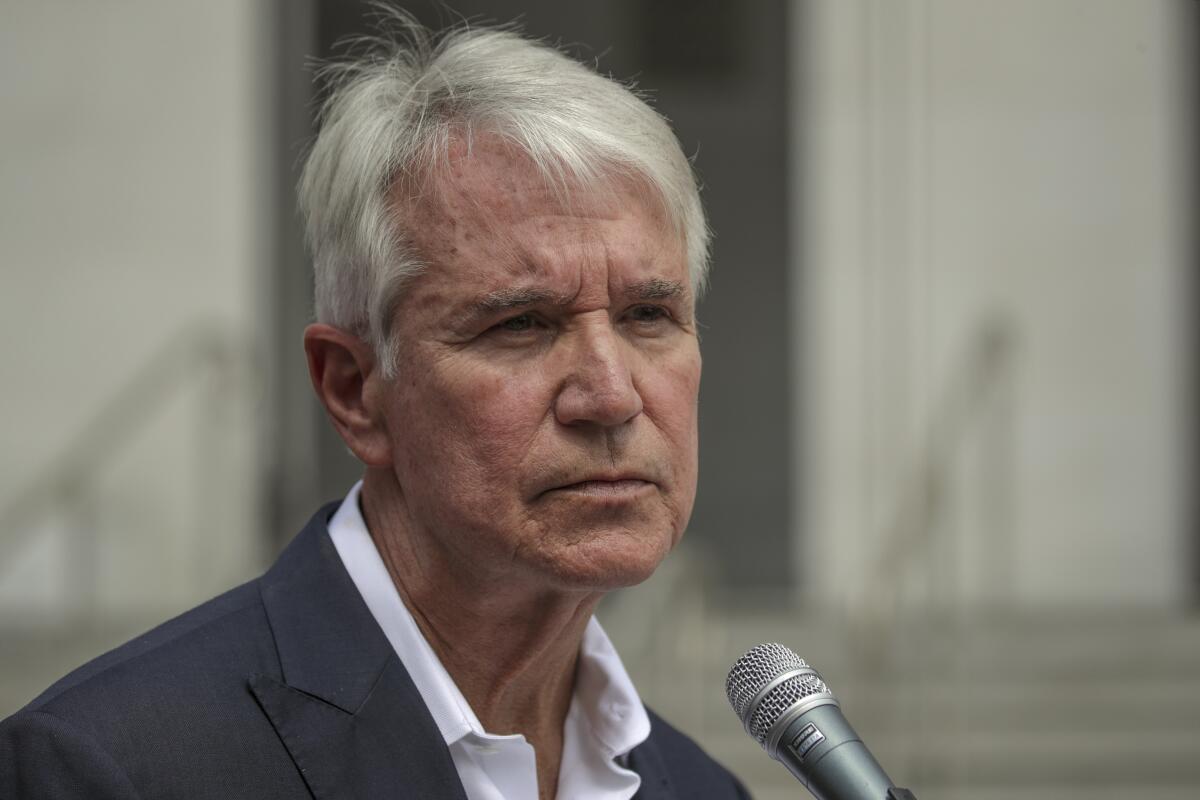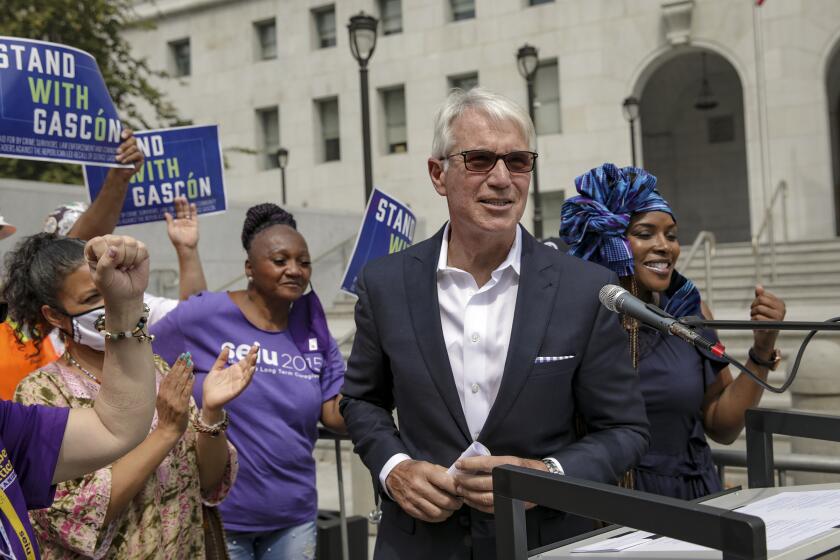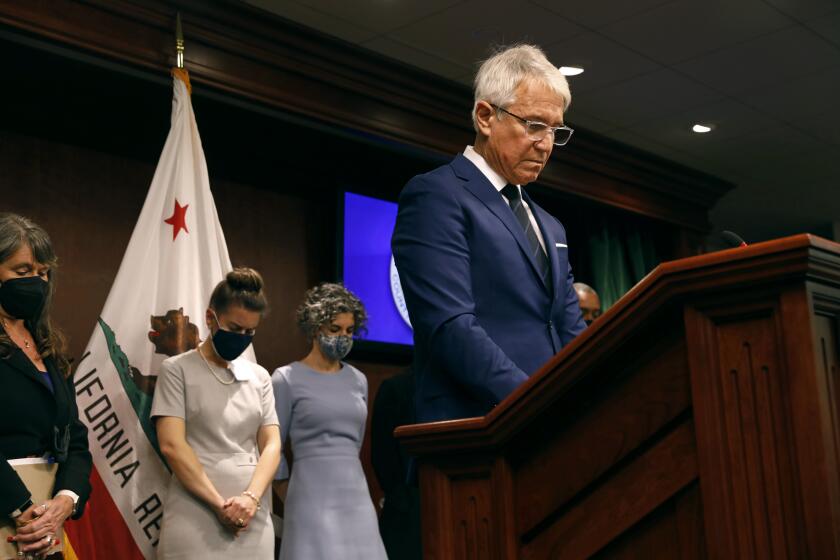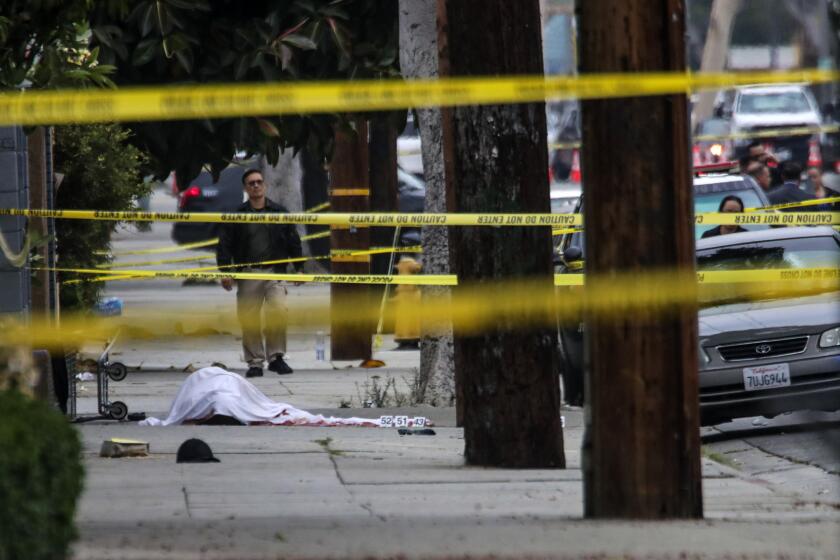After San Francisco, will L.A. County D.A. Gascón be recalled next? Inside the final push

- Share via
In a three-room office in West Los Angeles, volunteers tear open envelopes one at a time, hoping the contents will bring them closer to a goal that seemed impossible a year ago.
Los Angeles County’s progressive district attorney, George Gascón, has been the subject of intense criticism since he was elected in 2020. But attempts to channel that outrage into political will were unsuccessful during his first year in office. An initial attempt to recall him fell far short of its goal, lacking the fundraising or organization necessary to prove a real threat.
But in the last six months, a string of controversies, an open revolt among Gascón’s own prosecutors and rising concerns about crime and homelessness in Los Angeles have left Gascón vulnerable and helped a second recall campaign collect more than half a million signatures.
With its war chest growing and its signature tally estimated to be at or above the 569,000 needed by July 6 to trigger a recall election, the campaign has launched an all-out blitz to reach the finish line. Expanding its signature-gathering operation beyond signing tables in parking lots, the campaign mailed out more than 3 million petitions in May to registered voters from Palmdale to Long Beach.
Energized by the successful recall of Gascón’s successor in San Francisco, Dist. Atty. Chesa Boudin, the campaign is confident it can replicate that victory in Los Angeles, as long it receives enough signatures to force an election.
As they try to recall Los Angeles County Dist. Atty. George Gascón, prosecutors still must carry out the enormous workload of the office. With distrust running high, even mundane tasks get more complicated.
But experts on recall elections, and even some supporters, say the group still faces an uphill battle as the deadline approaches. They also say organizers may have made some tactical mistakes in their mail blitz. In addition, Boudin’s defeat has served as a warning to Gascón, who has stepped up counterattacks against the recall in recent weeks.
All told, the recall’s success or failure will likely depend on what comes back in the mail.
“The recall is quite literally and figuratively in the hands of Los Angeles County voters,” campaign spokesman Tim Lineberger said.
Joshua Spivak, a senior research fellow at UC Berkeley Law School’s California Constitution Center and an expert on recall elections, said the 500,000 signatures the campaign had in hand as of May 31 were “the minimum” it would need to have a chance at success. On average, Spivak said, up to 30% of signatures gathered in a recall will fail a verification test, meaning the campaign probably needs at least 700,000 signatures in hand by July 6.
After a tumultuous week that saw him backpedal on signature policies, L.A. County D.A. George Gascón’s reform agenda is under more scrutiny than ever.
The campaign will hit that mark if a fraction of the 3.6 million petitions it mailed out are returned with a valid signature. But Karen Roseberry, a former lead organizer with a Gascón recall drive that failed last year, said there are flaws with the campaign’s mail blitz.
She believes May was a poor time to launch the mail effort, fearing many petitions probably were ignored by voters already drowning in campaign mailers for June’s primaries. She also said the recall may be counting duplicate signatures; Roseberry signed a recall petition in January, yet still received a mail-in petition.
“If they were doing any sort of filtering or screening, I shouldn’t have gotten one in the mail,” she said, adding that people who signed early might mistake the mailer for a new recall effort and sign again.
Lineberger, however, said the campaign is checking for duplicates as part of its verification process.
Committee seeking to recall L.A. County Dist. Atty. George Gascón says it won’t meet October petition deadline, but will try again later this year.
In the West L.A. office, valid petitions roll in alongside letters of support, which are posted on a wall nearby. Volunteers are enthusiastic, saying the stream of mail is steady.
But among the positive responses, there are petitions returned with profanity-laced screeds in place of a signature. Some people have used the prepaid postage sent out by the recall to mail back textbooks or other heavy items, which ultimately costs the campaign money, Lineberger said.
Late Thursday, Los Angeles police responded to the recall’s offices after they received an envelope containing what Lineberger described as a “white powder.” The substance was “rendered safe” and no one was injured, according to Officer Drake Madison, an LAPD spokesman. The incident has been referred to the FBI for investigation, Madison said.
A judge has granted large portions of a petition filed by the union representing prosecutors that will bar Gascón from enacting some of his reforms.
The campaign has seen high rates of return on the mailed petitions in West L.A. and Beverly Hills, Lineberger said, especially among “upper-class Democrats.” While the mail blitz has reached more than half the county’s registered voters, Lineberger declined to say how, or if, the campaign targeted certain demographics or areas.
Growing frustrations with Gascón have centered on his all-or-nothing policy stances. On his first day in office, Gascón barred prosecutors from seeking the death penalty, trying juveniles as adults or filing sentencing enhancements, which increase the amount of prison time a defendant will face in certain situations, including if they use a gun in the commission of a crime.
Gascón has said he believes trying juveniles as adults or handing out decades-long prison sentences will only create more long-term problems instead of deterring crime, for example, making it harder for those defendants to reenter society.
But those policies have left Gascón in untenable positions when handling high-profile cases. He has expressed regret over his decision to allow 26-year-old Hannah Tubbs to plead guilty in juvenile court to a charge of sexually abusing a child because the crime happened when Tubbs was 17. The case stoked national outrage, especially after Tubbs mocked the sentence and expressed little remorse for her crime on leaked jail calls.
Just last week, Gascón faced criticism after it was revealed that one of his policies probably led to significantly reduced prison time in 2021 for a man who killed two El Monte police officers on June 14.
The man who shot and killed two El Monte police officers this week could have faced additional time in prison, but may have received a lighter sentence as a result of one of Los Angeles County Dist. Atty. George Gascon’s policies regarding ‘prior strike’ convictions. A judge later deemed the policy illegal.
There is no guarantee the shooter, Justin Flores, would have still been incarcerated if not for Gascón’s policies. Some defense attorneys also have said the plea deal Flores received was not out of the ordinary.
But the fact that Flores also may have faced reduced punishment because of a Gascón policy that was later deemed illegal made the case a handy weapon for a recall effort that often paints the district attorney as a detriment to public safety.
Gascón called a hasty press conference to defend his handling of Flores’ prior case Tuesday, noting that Flores had never been arrested for a violent crime before. Based on Flores’ record, he said the plea deal offered was appropriate, regardless of his policies.
“I recognize these are very difficult times and they’re difficult for many reasons. Understandably, many of us are angry,” he said. “We all wish that we could predict violence, but the reality is that we can’t.”
Gascón backpedaled on some of his absolutist policies earlier this year. Prosecutors can now seek approval from committees to try juveniles as adults or to seek a life sentence in a murder case. But he said those shifts were not a result of the recall effort or external criticism.
In a major shift, L.A. County’s top prosecutor said he will allow his office to seek life sentences and to try juveniles as adults in some cases.
“The concept that these changes were made solely because of the outside pressures, I know it may appear to be that way, but I can tell you it’s much more nuanced than that,” said Gascón, insisting the committees had been in the works for months. “Frankly, regardless of where the recall goes, there will be additional adjustments.”
Recall campaign manager Gregory Foster referred to the first recall attempt as an educational effort, one that was split between different organizing groups and mostly run by crime victims with little structure. The current campaign has 10 paid staffers, including field managers who have taken ownership of specific sections of sprawling L.A. County, he said.
The second recall effort also has benefited from fortunate timing, launching as public safety was at the forefront of voters’ minds, Foster said. Los Angeles suffered its highest homicide total in 15 years in 2021, a total it’s on pace to eclipse this year. And Gascón became a factor in the much-watched L.A. mayor’s race, with billionaire developer Rick Caruso endorsing the recall.
“Two months into the recall was the perfect melting pot of just everything going on in Los Angeles,” Foster said. “It highlighted the failures of Gascón’s policies, and it was getting national attention.”
There is often a disparity between fact and feeling when it comes to Gascón’s critics, however.
A Times analysis earlier this year raised significant questions about the recall campaign’s attempts to blame Gascón’s policies for increases in crime. While homicides have surged during Gascón’s tenure, violence also has climbed significantly in jurisdictions overseen by prosecutors who oppose Gascón, such as in San Diego and Sacramento. Experts said it is unlikely Gascón’s policies immediately affected crime rates.
During Gascón’s first year in office, prosecutors also filed felony cases at a near identical rate to what they did during ex-Dist. Atty. Jackie Lacey’s two terms. Lineberger and other recall leaders have often shrugged off any discussion of filing rates or data showing rising crime in other jurisdictions.
As the recall has gained steam, Gascón has begun to push back. He recently hosted a number of digital town hall meetings to address filing decisions, his juvenile policy and violent crimes. Each event has been titled “For The Record: Learn The Facts. End Misinformation.” He also has made a series of radio and television appearances recently to combat what he sees as an unfair narrative connecting his policies to high-profile crimes.
Gascón’s anti-recall campaign, meanwhile, issued an email blast the day after Boudin’s defeat, painting the L.A. recall effort as a partisan power grab.
“The Republican Party, including those committed to tough-on-crime policies, started organizing the minute we elected George Gascón as district attorney. Rightwing groups blamed him for every problem in Los Angeles, lied about the causes of crime, and started collecting signatures,” the email read. “Their first recall effort failed. Not to be deterred by the results of a free and fair election, they started again spending big.”
While the recall has tried to brand itself as a bipartisan effort, many of its most visible voices, and most of its financial support, come from conservative circles.
Geoff Palmer, a Beverly Hills-based mega-donor to former President Trump, was the largest individual donor to the recall as of March 31, funneling $600,000 into the effort, according to campaign finance reports. Gerald Marcil, another frequent donor to conservative causes in California, has poured in $313,000. The two together account for nearly a quarter of the recall’s publicly documented funding.
Lineberger, the campaign spokesman, is an alumnus of Trump’s 2016 presidential campaign. He has worked for Orange County Dist. Atty. Todd Spitzer, a Republican, and Larry Elder, who failed to unseat Gov. Gavin Newsom in a recall election last year. One of the recall’s co-chairs, Steve Cooley, was L.A. County’s last Republican district attorney. Recall organizers also held an event alongside Elder last year.
Two high-profile registered Democrats — Caruso and L.A. County Sheriff Alex Villanueva — are backing the recall. But Caruso spent most of his life as a registered Republican. Villanueva has fallen out with L.A. County’s Democratic Party and run a Trump-adjacent reelection campaign, which has featured attacks on the “woke left” and the media.
Foster, the recall campaign manager, pushed back, saying many of the council members in the nearly three dozen cities who have cast “no-confidence” votes against Gascón since his election are Democrats. He also insisted “there’s no partisan politics whatsoever in our committee.”
“We have Democrats. We have Republicans. We have left leaning, we have right leaning,” he said. “Wherever you go in politics, you’re going to see money coming from either side.”
The campaign had raised $3.9 million as of late March. Up-to-date fundraising reports won’t become public until early July, but Lineberger said the campaign had collected roughly $7 million as of late May.
Gascón maintains the recall is being driven by money and misinformation, and has expressed frustration about his inability to debunk what he calls “myths” about his office.
His woes echo those of Boudin in San Francisco. Despite the fact that overall property and violent crime actually decreased during Boudin’s two terms in office, many voters said they simply didn’t feel safe. And individual crime categories, such as burglary and car theft, did explode under Boudin.
Some recall supporters insisted any statistics showing crime decreased under Boudin only reflected the fact that citizens had stopped reporting crime out of frustration.
Navigating that perception has proved tricky for Gascón.
“I’m not denying the perception; the perception is there,” he said. “The perception is reality.”
More to Read
Sign up for Essential California
The most important California stories and recommendations in your inbox every morning.
You may occasionally receive promotional content from the Los Angeles Times.















